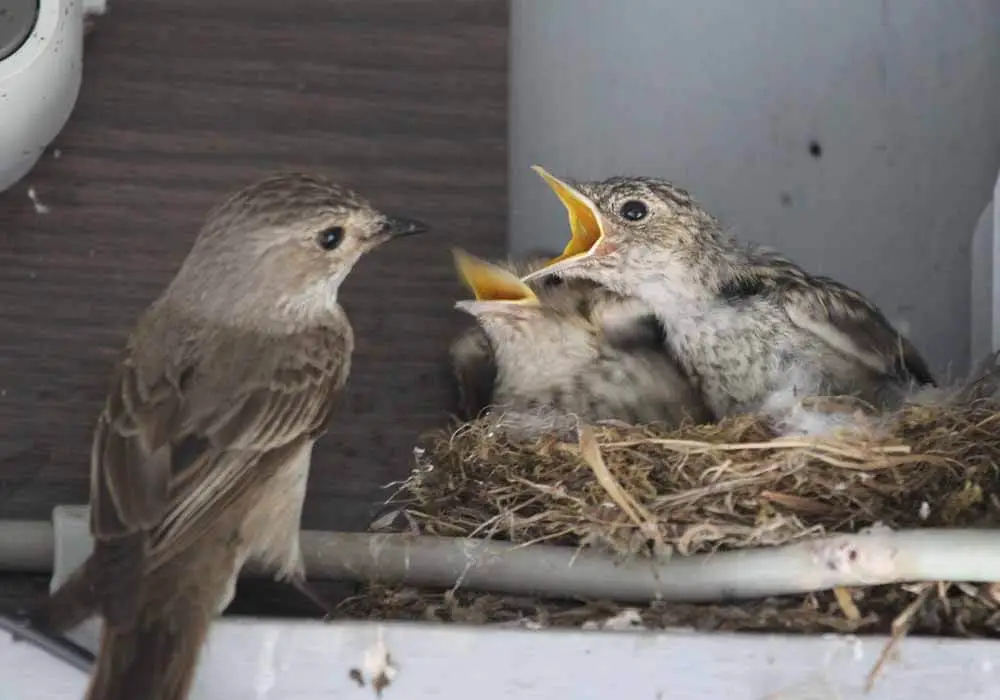How Do Birds Leave the Nest?
Here's The Stages Birds Take From Egg To Flight...
Birds go through a life cycle similar to other animals: after hatching, they are nurtured by their parents until they are ready to leave the nest. However, one may wonder - how do birds leave their nest eventually?
Most birds leave their nests for a short period to walk around and explore their surroundings. Once they start to grow feathers, they leave for a longer time to stretch their wings and try flying. Once they are confident fliers, juvenile birds will leave the nest for good.
This article includes everything you need to know about how birds leave their nest. It also examines how long it takes for common bird species to leave their nest.

What Are the Stages of Leaving the Nest?
The first stage of a bird’s life is when it hatches from its egg. They then make small forays out of the nest by walking and hopping. As the baby bird’s wings develop, they become a fledging. Eventually, they take their first flight and leave the nest as a juvenile.
These stages are explored below in further detail.
Hatchling
A baby bird that has just hatched is called a hatchling. Hatchlings stay in the nest and beg for food. They typically feed on the yolk of their egg and rely on their parents to regulate their body temperature.
At this stage, the baby bird can’t move and most definitely can’t leave the nest.
Chick
Once the baby bird finishes eating the yolk, it will become a chick. Chicks can walk, waddle, or hop near their nest. They can leave the nest for a short time but are closely supervised by their parents.
Chicks will always come back to their nest as they can’t find food or shelter for themselves.
Fledgling
When they are a few days old, baby birds begin to grow their feathers. These feathers grow longer and take the shape they need to help the bird fly. They also have large bills. These birds are called fledglings.
Once they begin to grow their feathers, parents will encourage baby birds to leave the nest more often. This is because the baby birds need room to spread out their wings.
When a bird is a juvenile, it may begin to take short flights away from its nest. However, they stay close to their parents as their flying skills aren’t at their best. They return to the nest to get food and comfort from their parents.
Juvenile
Once birds are confident fliers, they are ready to leave the nest. They will officially leave their parents' nest but stay nearby so they can continue to get the support of their family as they mature. Over the next few months, they will continue to grow and may eventually move away from their ‘neighborhood.’
How Long Does It Take Baby Birds To Leave the Nest?
Different species of birds leave the nest at different times. Most baby birds leave the nest when they are between 12 and 21 days old. However, some species, like raptors, can take up to ten weeks to leave. Even after they leave, juvenile birds rely on their parents for food.
Here are some more details about how do birds leave the nest for some common bird species:
- American Robin. Baby American robins will leave the nest when they are 14-16 days old. After they leave, their father may continue to watch them if they remain nearby.
- Northern Cardinal. Cardinals are common songbirds that incubate their eggs for 14 days. After they hatch, baby cardinals leave the nest when they’re between seven and 13 days old.
- House Sparrow. Baby house sparrows will leave their nest between 15-17 days old. Baby sparrows may begin to nest in nearby abandoned nests.
- American Goldfinch. Baby goldfinches leave their nest between 11-15 days old.
- Blue Jay. Baby blue jays stay in the nest for a significant time after hatching. They typically leave the nest 17-21 days after they hatch.
- American Crow. Baby crows also stay in their nest for a significant amount of time. They don’t leave the nest until they are at least a month old. Most crows will continue to stay near their parents and help them raise another round of young crows.

The nesting habits of birds can be a fascinating thing. We've written an article dedicated to further explaining these habits which you can find here.
Also, here's a page of ours that's full of facts about birds nests that we think you'll find of interest.
How Long Do Baby Birds Stay With Their Mother?
Baby birds stay with their mother for up to a month while becoming juveniles. Once they can fly confidently, they leave their mothers’ nests. However, they will stay close by until they are fully grown. They rely on them for food, protection, and physical comfort.
Food
In their early days, baby birds eat the yolk from their eggs. However, once the yolk is fully consumed, they rely on their parents for food. Bird parents will hunt for insects and worms or eat seeds. They will eat these and then regurgitate them to feed their babies. how do birds leave the nest
When baby birds get older, their mothers will teach them how to look for food and hunt.
Protection
Many bird species rely on their parents for protection until they become juveniles. Parents may hide their babies in their nests or under their wings. They also closely watch predators and alert their babies if they sense danger.
Some species also help protect their babies from the elements. For instance, they help their babies regulate their body temperature and may fortify their nest in windy weather.
Where Do Baby Birds Go When They Leave the Nest?
After leaving their nest, baby birds tend to stay nearby because they still rely on their parents and family for security and food. As they age, they may venture further away from their original nest. Eventually, they may move a few miles away to establish their nests.
Here is a breakdown of where some common species go when they leave their nest:
- American Robin. After leaving the nest, robins will stay near their parents for at least 21 days. They may establish territory a few miles away from their parents’ nest.
- Northern Cardinal. Even after leaving the nest, cardinals stay close to their parents. Their fathers will continue to bring them food until they become proficient hunters.
- House Sparrow. Once sparrows are fully grown, their parents will leave the nest. The juvenile house sparrows may stay in their parents’ nest until they are ready to breed.
- American Goldfinch. After they leave their nest, baby goldfinches will search for other goldfinches that are also juveniles. They then form a flock and work together to find food.
- Blue Jay. After they leave their nest, baby blue jays will stay near their parents for three months. They will partially rely on their parents for food. After three months, blue jays will move further away from their parents to find their territory. They may return to their parents in the summers for food.
- American Crow. Some crows will leave their nest to find their territories. However, two or three crows from every brood will stay with their parents to help them raise their next brood.

When young birds go to leave the nest, how do they learn how to fly? Since birds can't access YouTube videos for lessons there must be a way. Learn all about this fascinating process in this article of ours.
How Do Birds Leave The Nest...Final Thoughts
Most birds will stay near their parents even after they leave their nest for at least a few weeks. This helps them get food and take advantage of community protection. After this, most of them will go further afield to establish their own territory.
Return To The TOP Of This How Do Birds Leave The Nest Page

About the Author...
Richard Worden, a dedicated bird lover for over 20 years, I love to share my in-depth knowledge and passion for birds. Read more About Me and my expertise in this field.
- We Know Birds HOME ›
- Bird Flight and Nesting Facts ›
- How Do Birds Leave the Nest?
